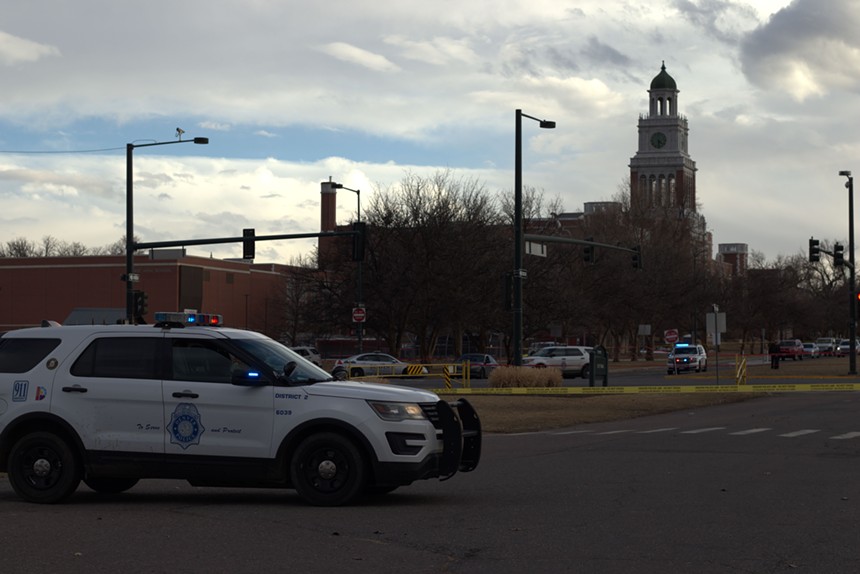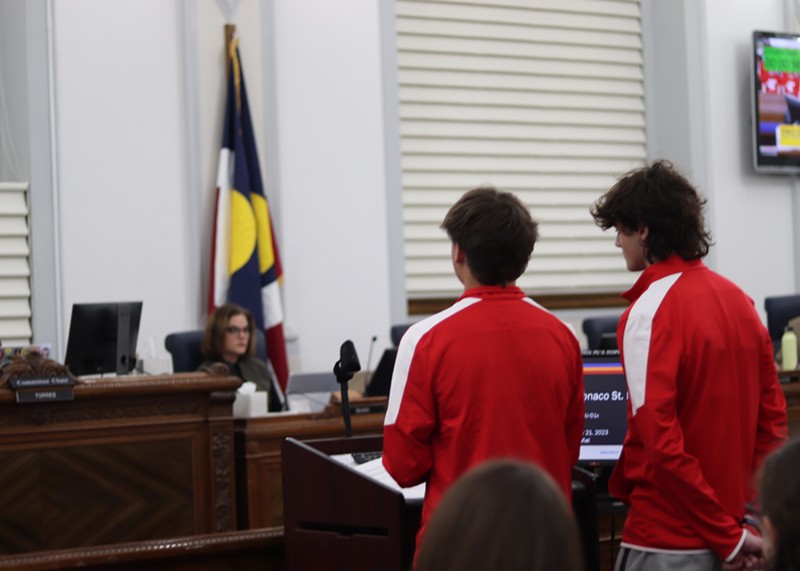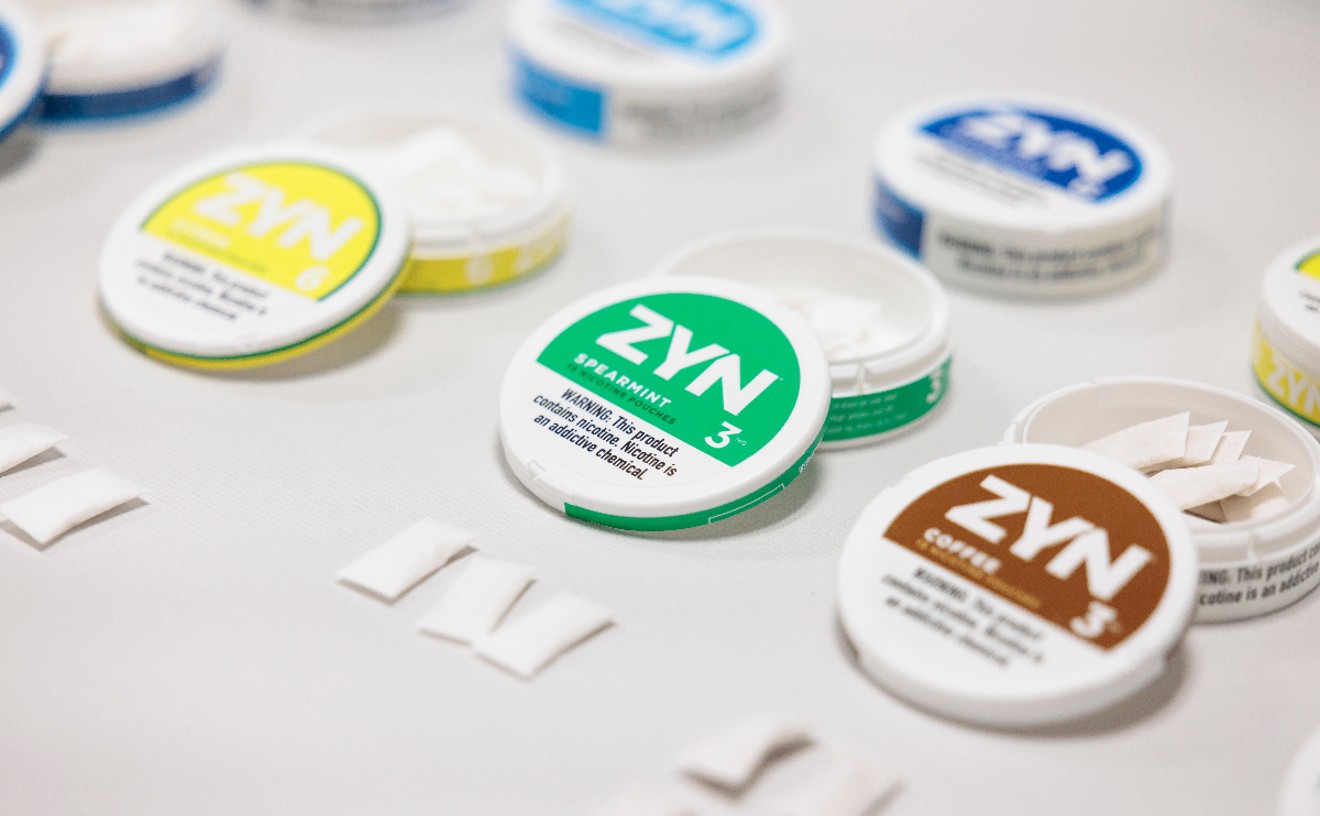This story has been updated with the news that East High School student Luis Garcia died of his gunshot injuries on March 1.
On the afternoon of February 13, a secure perimeter — where all exterior doors of a school are locked after a threat is identified, and no one can go in or out — was enacted at Denver’s East High School.
Noah, a sophomore at East, thought little of it at first.
“We were in our second-period class, and we just thought of it as normal, because we have all these drills — these things happen all the time,” says Noah, who asks that his last name not be used.
Later that day, news broke that a sixteen-year-old East student, later revealed to be Luis Garcia, had been shot and critically injured in his car just outside the school. “I started shaking,” Noah recalls, adding that he was rocked by the way the world seemed to continue on as normal despite the horrifying abnormality of what had just taken place just outside his school.
On March 1, the family announced through a representative that Garcia had died from his injuries. The Denver Police Department says the investigation is ongoing.
The incident ignited yet another conversation around student safety in an era of rising juvenile violence, crime-wave panic and endless school shootings. And within that conversation, some in Colorado began to rekindle a nearly three-year-old grievance.
“Would this horrible tragedy have happened if DPS school board didn't drop School Resource Officers?” tweeted Van Schoales, a senior policy director at Keystone Policy Center — a nonprofit that advises leaders in a variety of sectors and is based in the ski town that shares its name — a day after the incident.
In a controversial 2020 decision, the Denver Public Schools Board of Education had approved a resolution to terminate all Student Resource Officer contracts with the Denver Police Department, stating on the district’s website that “part of the reasoning for this decision is the belief that the close proximity of law enforcement to students on campuses directly contributes to the school-to-prison pipeline.” The statement continues: “As we make this gradual transition, we will work closely with school leaders, staff, parents/families and students in the coming weeks to understand and prioritize their needs to ensure the safety of students, staff and communities.”
On February 22, thirteen days after the East incident and the morning after a group of students from the school brought concerns about gun control and student safety to a Denver City Council meeting, Boulder police responded to an unconfirmed report of an active shooter at Boulder High School. Boulder Valley School District also ended its SRO program in early 2022.

Auon’tai Anderson, vice president of the DPS School Board and one of the main drivers behind the 2020 decision to get rid of SROs, responded to Schoales’s tweet, saying, “While I understand your desire to have SROs reinstated, it's important to note that even if there had been an SRO present on campus, they would not have been able to prevent the drive-by shooting that occurred on the city streets outside of the school. As a member of the board, I believe that it is essential for the city to step up and address the root causes of gun violence. The school board is not city council.”
With the school board deflecting responsibility to city council, student activists went to the February 21 council meeting to share their concerns.
The group of students included local members of the Students Demand Action organization (a national anti-gun violence advocacy group) and several players from East’s soccer team, which had counted Garcia among its teammates. They were joined by Noah Kaplan, a former East High speech and debate teacher and current candidate for the District 10 City Council seat.
The students told council that not only did they want the city to deal with the root causes of this kind of violence, but they also want to feel safe and protected while those longer-term solutions are put in place. “We’re scared,” senior Zeke Lubin told the council.
And as student Noah later told Westword, “Right now, we want mitigation.”
The students don’t agree on what immediate steps should be taken, but nothing is off the table. “We just had a meeting with Noah Kaplan, and we talked about, maybe school resource officers, but then there can be some challenges that come along with that,” East junior Olivia Nusbaum said after the meeting.
Kaplan says that the topic of SROs comes up “regularly,” adding that he has concerns about both the effectiveness of SROs in protecting students (he also noted that SROs would not have prevented this incident) and the possibility of SROs themselves becoming a threat to students. Many have discussed the school-to-prison pipeline and how SROs can often escalate a disciplinary issue with a student into a criminal case.

“The complicated relationship that schools have with law enforcement needs to be acknowledged, but we also need to make sure we’re acknowledging the importance of keeping our young people safe. All options should be on the table in the pursuit of that effort,” Kaplan says.
He emphasizes the importance of having an open conversation about what the re-implementation of SROs might look like. Students have different perspectives and feelings about SROs, he says, and it is important for their voices to be heard when making that decision.
“The main thing is just getting student input if we do put that in place,” Nusbaum said following the council meeting.
According to Kaplan, a re-implementation of SROs should also involve a re-examination of the role that SROs would have in schools. “If you were to get SROs, you would want them to be the best possibly trained, and they would need to have some understanding of the people that they were tasked with serving — that they are there as much as a community engagement and protection mechanism, as opposed to an enforcement mechanism,” he says.
Colorado currently does not require police officers to complete any training to become an SRO, though a proposed bill at the state legislature aims to change that.
Kaplan also thinks schools and their communities should be involved in the process for selecting an SRO, should they choose to have one, “as opposed to having one assigned to the school without any community input. I think there’s an opportunity to create stronger connections between the people who are tasked with protecting and serving our community and the people who are being protected and served [by] having SROs who are culturally responsive and understanding of the diverse needs of the communities that they serve," he explains.
Kaplan notes that the conversation around long-term solutions is just as important as the debate around SROs and other immediate measures. “If we just treat every event reactively, we will continue to chase our tails,” he says. In general, he believes that solution includes “making sure we’re getting guns off the street, making sure that we have good touch points inside communities where violence is occurring regularly, and making sure that we’re doing what we need to do to build a social and societal ecosystem that prevents this violence from happening before it happens.”
The student activists agreed that gun control will be an important step toward a solution, with some of them telling city council members that the presence and normalization of guns has played a large role in the proliferation of this kind of school-associated violence.
The students called for stricter gun control, red flag warnings and safe-storage techniques to keep guns out of the hands of young people. “We don’t want to take away people’s guns,” says Noah. “They can have them if they want, but we do want to prevent them from being used to shoot up a school.”
After the public comment session had ended, in a somewhat unusual move, a few councilmembers spoke with the students directly, to reassure them that their activism means something and that solutions can be achieved.
“Honestly, we just want to see change,” Nusbaum says. “Something needs to happen. Our school has been through so much this year, and we just want to see something happen so it doesn’t happen again.”











